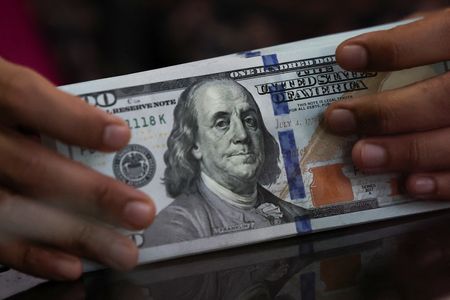By Karen Brettell
NEW YORK (Reuters) -The Japanese yen gained on Tuesday, rebounding from seven consecutive days of losses against the U.S. dollar, after comments from a Japanese minister and U.S. Treasury Secretary Scott Bessent eased some concerns about more expansionary fiscal and monetary policy in the country.
Japan’s new economic revitalization minister, Minoru Kiuchi said that Japan can boost its long-term potential growth by stimulating demand and keeping the labor market tight while being mindful of the need for fiscal discipline. Kiuchi also said that the government is closely monitoring the impact of currency moves on Japan’s economy.
“That has helped to improve sentiment around both the JGB (Japanese government bond) market and the yen,” said James Lord, head of FX and emerging market strategy at Morgan Stanley.
“I think foreign investors in particular have had a view that the Takaichi administration may be a little bit more stimulative when it comes to fiscal policy. These comments today are leaning in the other direction, that perhaps A, there may not be as much fiscal stimulus and B, the government is sensitive to movements in the yen,” Lord said.
The Japanese currency was further supported as Bessent highlighted the important role of “sound monetary policy formulation.”
“Bessent is stating a clear preference for conventional policy tools like interest rate hikes rather than FX intervention, that took dollar/yen down,” said Kamal Sharma, senior FX strategist at Bank of America.
The comments came during a meeting with Japanese counterpart Satsuki Katayama, in the latest swipe at the slow pace of interest rate hikes by the Bank of Japan (BOJ).
“That was interpreted by the market as maybe encouraging the BOJ to hike rates,” said Morgan Stanley’s Lord.
The Bank of Japan is expected to hold rates steady when it concludes its two-day meeting on Thursday, but the focus will be on whether it provides clues on the timing of the next hike.
The Japanese yen was last up 0.44% against the greenback at 152.18 per dollar.
The European Central Bank is also expected to leave rates unchanged on Thursday while the U.S. Federal Reserve is likely to cut rates on Wednesday.
The greenback whipsawed against the euro on Tuesday amid multiple U.S. economic releases.
The dollar gained after the ADP National Employment Report’s inaugural weekly preliminary estimate showed that U.S. private payrolls increased by an average of 14,250 jobs in the four weeks ending October 11.
It turned negative, however, after the Conference Board said U.S. consumer confidence eased in October as households worried about the availability of jobs over the next six months and persistently higher prices because of tariffs on imports.
The dollar index was last down 0.08% at 98.69, with the euro up 0.14% at $1.1659.
The single currency also hit the highest level against the British pound since May 2023 and sterling dropped against the dollar to the lowest since August 1.
Britain’s budget watchdog is expected to cut a key productivity forecast by 0.3 percentage points, potentially leading to a 20 billion-pound ($26.8 billion) hit to the public finances.
The Bank of Canada is also widely expected to cut rates on Wednesday, though Morgan Stanley holds a nonconsensus view that it will leave rates unchanged.
“We think it is likely that they are going to take a skip this time, largely because the data’s been better than expected. So, we’re short USD/CAD,” Lord said.
The Canadian dollar was last up 0.34% versus the greenback at C$1.39 per dollar.
Traders are also focused on the prospect of trade deal between the United States and China ahead of a meeting between Trump and Chinese President Xi Jinping in South Korea on Thursday.
The Australian dollar, often seen as a proxy for risk appetite, strengthened 0.46% versus the greenback to $0.6586, the highest since October 9.
In cryptocurrencies, bitcoin gained 0.17% to $114,719.
(Reporting by Karen Brettell; Additional reporting by Ankur Banerjee and Lucy Raitano; Editing by Sharon Singleton, Will Dunham and Nick Zieminski)












